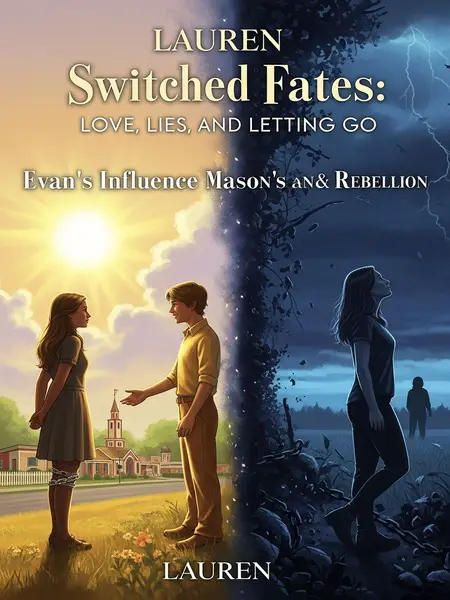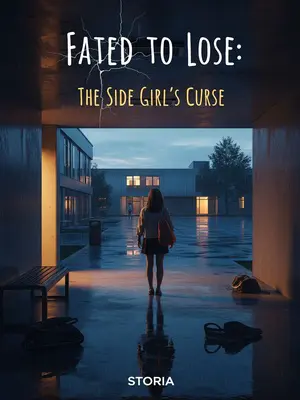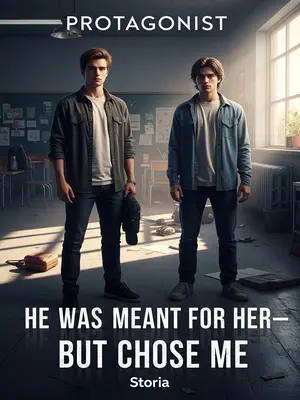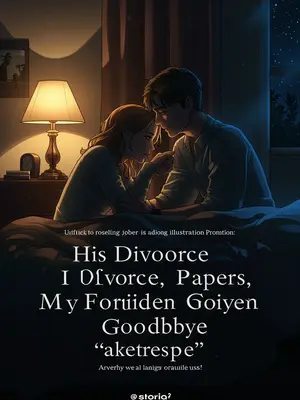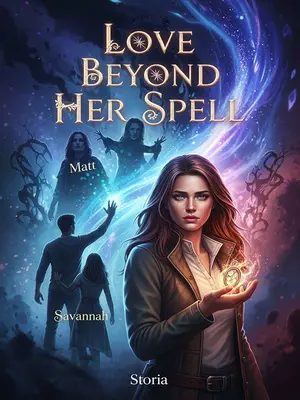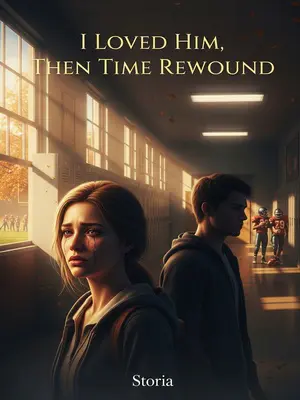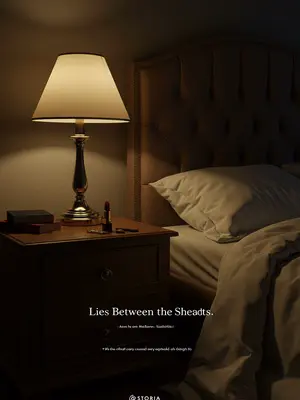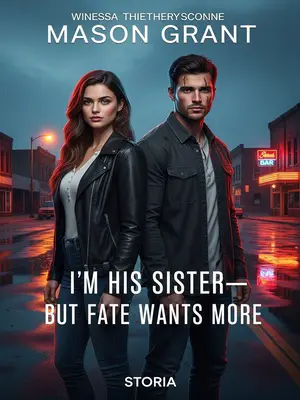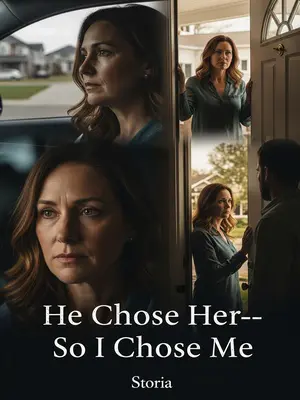Chapter 8: Skittles and Second Chances
I didn’t understand at first.
I looked up at him, confused, and he gave a small, crooked grin, rubbing the back of his neck in a rare moment of shyness.
He looked ahead, his profile smooth and youthful, determined and handsome. He seemed to smile. “Other classmates have come to my house before. My dad poured them tea, and they politely held the cup, but never took a sip.”
There was a hint of sadness in his voice, and I realized how hard it must be to watch people reject your hospitality.
I was silent. Maybe that environment made them uncomfortable. I didn’t know what to say. I just didn’t want to waste it.
I shrugged, looking at the cracked sidewalk. “It seemed rude to leave it.”
After all, he always drank tap water.
If you don’t drink it, the electricity is wasted.
I remembered his words, and for the first time, I understood what he meant.
After thinking for a moment, I said, “Your little orange cat is cute.”
I’d spotted it curled up on the window sill, watching us with wide, curious eyes. It looked like a scrappy little thing—maybe a stray he’d taken in. “What’s its name?”
He hadn’t expected that. After a long pause, his cold face softened, and then he laughed. It was the first time I’d seen him smile like that. He was always mature and steady, but this smile had a rare boyishness. “I just picked up Pumpkin a few days ago. He’s just weaned—I don’t know if he’ll make it.”
He reached down to scratch Pumpkin’s head, his fingers gentle. “He’s a fighter, though. Keeps me on my toes.”
He paused, turned to look at me, his eyes focused, unexpectedly gentle, with a faint smile. “If you like him, you can come see him.”
His invitation was quiet, almost shy, and for a moment, I felt a warmth spread through me.
I didn’t know if Mason and I could be considered friends, but I always felt a strange connection with him, like we were on the same wavelength—two underdogs just trying to keep our heads above water.
It was like we recognized something in each other, even if we couldn’t name it.
I nodded and said, sure.
I smiled, promising myself I’d visit soon, though deep down, I wasn’t sure I’d ever have the courage.
Unfortunately, I never went again.
Life got busy, and I let the days slip by, telling myself there would always be time. I was wrong.
4
I realized Mason’s unusual attitude toward me after an exam.
It was one of those gray, drizzly days when the world felt heavy. I remember the way the rain tapped against the classroom windows, the scent of wet pavement drifting in.
I always thought Mason and I were the same kind of people—cold to the bone, indifferent to things that didn’t concern us. But he paid too much attention to me—for someone like him.
It was subtle at first—a glance across the room, a question answered just for me. I tried to ignore it, but it became harder with time.
Mason’s midterm scores were truly astonishing, nearly perfect.
The teachers posted his results on PowerSchool, but also pinned them to the bulletin board outside the office, and even the seniors stopped to stare, shaking their heads in disbelief.
Our exams were all written by top state teachers. His total score was 130 points higher than mine—something unprecedented in the school’s history. That kind of gap between first and second place had never happened before.
There was a buzz in the hallways, whispers trailing behind us wherever we went. I felt both proud and frustrated, unsure how to feel about being second for the first time.
I stared at each test, unable to figure out how Mason could be so much higher than me.
I pored over every question, every answer, searching for the secret to his success. It felt like chasing a ghost.
As he passed my seat, I was looking at the physics test. Physics was my weakest subject, and the one with the largest gap between us. I looked at the last big question, but couldn’t solve it no matter what.
My pencil hovered over the page, eraser worn down to a nub. I bit my lip, refusing to give up.
He paused by my seat, his voice lightly amused: “You can’t solve it like that. There’s a printing error. The assumed value R was printed as 3. Either could work, but if it’s 3, it can’t be solved. Try changing the number.”
He spoke quietly, so only I could hear, his tone gentle but firm.
I looked up at him. He stood beside my desk, looking down at me. Because he was tall, he seemed to tower over me. The light was behind him, so I couldn’t see his expression, but I could see his lips slightly upturned, his tone carrying a subtle smile.
For a second, I felt like we were the only two people in the room.
I paused.
The moment stretched between us, heavy with things unsaid.
I’d seen girls ask him math questions before, including rich girls with ulterior motives. Mason, though poor, had a charisma that came from his looks and steady personality. To these young ladies, he was like a rare treat.
They’d giggle and toss their hair, hoping to catch his eye, but he never seemed interested.
But Mason was unyielding. No matter how beautiful the girl, he rejected all of them without mercy.
It was almost legendary—the way he turned down every invitation, every flirtation, with a polite but firm shake of his head.
I looked at him. Maybe my silence lasted too long, so he misunderstood. He paused, smiled faintly, and said, “If you can’t solve it, I can teach you.”
His offer was genuine, not condescending, and for a moment, I considered accepting. My heart fluttered, wondering if maybe this was a chance for something more.
One can’t refuse a smiling face. He was polite to me, so I was polite to him.
So I nodded to him, distantly: “Thank you.”
He smiled, just a little, and moved on, leaving a trail of whispers in his wake.
He stood quietly by my desk for a while. I wasn’t used to asking for help, so I kept my head down, working on the problem myself.
The numbers blurred together, but I refused to let myself cry. I was determined to figure it out on my own.
Halfway through, I realized Mason had left at some point.
The seat beside me was empty, and the room felt colder somehow.
5
My grades caused my mother great anxiety.
She hovered over me like a storm cloud, her moods shifting with every report card.
Because I was always first before.
First place was more than a number—it was my lifeline, my ticket to a future I could barely imagine.
Her anxiety came from a joke among the elders. Evan’s mother once asked him why he liked me so much. Evan replied offhandedly, “Because she’s good at studying.”
The story became family legend, repeated at every holiday dinner, as if my worth could be summed up in a single sentence.
Evan’s mother was also satisfied with me, because I was quiet, focused on studying, had no other hobbies, didn’t like to play or show off, was low-key and well-known. In her words, “Lauren is really suitable to be a daughter-in-law.”
She’d pat my hand, her rings glinting in the light, and I’d smile politely, hiding my discomfort.
After that, my mother treated my grades as a matter of life and death. Dropping a single point felt like losing not just a point, but the ticket to marry into the Carter family.
She’d pace the living room, muttering to herself, her anxiety contagious. I learned to dread the sound of the mailbox.
Let alone dropping a rank this time.
The day the rankings came out, she slammed the door so hard the picture frames rattled. I braced myself for the storm.
So one day when I came home from the library, I found Mason standing in our front yard.
He looked out of place, his hands shoved in his pockets, eyes fixed on the ground. The maple tree overhead shed its leaves around him, a golden halo in the fading light.
My mother smiled at me: “Lauren, this is your classmate Mason Reyes, the top scorer this time. I invited him to tutor you.”
Her voice was sweet, but her eyes were sharp, watching for my reaction.
Mason stood under the old maple tree, looking back at me.
He didn’t flinch, just met my gaze with quiet confidence. For a moment, I saw the boy he might have been, before life got so complicated.
The contours of youth were becoming more defined. His eyes were calm. For some reason, I suddenly thought of the saying, “The tallest tree catches the wind,” but he was the kind of tree that couldn’t be blown down, standing tall in the gale.
He reminded me of the old oaks in the park—weathered, but unbowed.
Evan once said, no matter how good he is, he’ll still work for the Carter family.
I remembered the way Evan laughed, tossing the words over his shoulder like they meant nothing.
But I didn’t think so. Mason was like a falcon about to soar. One day, he would roam the skies.
I pictured him standing on a rooftop, wind in his hair, ready to take on the world.
Don’t look down on a poor kid. He would make his own era.
Some people are born different.
There was a stubbornness in him that I recognized—a refusal to be defined by anyone else’s story.
I hugged the books in my arms, feeling an inexplicable anticipation. I looked forward to Mason’s future. We were so similar, but he didn’t bear the shackles I did.
He was free, in a way I could only dream of. I envied him, even as I tried to hide it.
He was like another me. I looked forward to seeing how far he could go. My heart pounded, but I remained calm, looking at him as always—cold and indifferent.
I kept my expression neutral, unwilling to let anyone see how much I cared.
He also looked at me in silence, until I looked away first.
The moment stretched between us, heavy with unspoken words.
His tutoring wasn’t very serious. He was so smart that maybe he thought everyone was as quick as him. When he explained problems, he only pointed out the direction, then let me figure out the rest and draw inferences.
He’d tap the page with his pen, offering a hint, then wait for me to catch up. It was frustrating, but oddly motivating.
I’m quiet by nature, so many people thought I was gentle and obedient, but deep down, I was stubborn.
I refused to ask for help, determined to prove myself, even if it meant staying up all night.
If I didn’t understand something, I wouldn’t ask him, not until I solved it myself. He only needed a glance to get the answer in his head.
He’d smile, just a little, when I finally figured it out, and for a moment, I felt seen.
Besides being smart, he treated everyone with courtesy and dignity, never servile or arrogant.
Even the teachers respected him, and the other students grudgingly admired him, even if they’d never admit it.
Even my mother praised, “Mason’s a good kid, just a pity…” She sighed. I knew what she left unsaid: just a pity, he didn’t have a good family.
She probably never imagined that everything Evan had should have belonged to Mason.
If she knew, maybe she wouldn’t have broken Mason’s leg.
The thought made my stomach twist, but I pushed it away, focusing on the homework in front of me.
6
Mason and I fell out on Evan’s birthday.
The house was filled with the scent of sugar and vanilla, laughter echoing from the living room as guests arrived with armfuls of presents.
Every birthday cake for Evan after his twelfth was made by me.
It became a tradition, one I both loved and hated. The kitchen was my stage, and the cake was my offering.
My mother taught me this. When Evan turned thirteen, the gifts sent to the Carter family piled up like a mountain. Only she was indifferent, sneering, “A family like the Carters—what haven’t they seen? The most important thing is sincerity.”
She’d watch me crack eggs and sift flour, correcting my posture, insisting that every detail mattered.
So a month before Evan’s birthday, she hired a top pastry chef to teach me how to make cakes.
The chef was stern but kind, showing me how to pipe roses and smooth icing until my hands ached.
A month later, before Evan’s birthday, I could already make cakes as exquisite as those in bakery windows. But my mother bent down, her gaze passing carelessly over the cake in front of me, saying, “Lauren, you can make it a bit clumsier. That way, it seems more sincere, understand?”
She wiped a smudge of frosting from my cheek, her eyes calculating. I nodded, swallowing my pride.
So the cake I brought out in front of everyone for Evan had uneven frosting, crooked writing, and lopsided decorations.
It looked homemade, imperfect—the kind of cake you’d find at a church bake sale, not a society party.
But Evan was very happy. He didn’t like sweets and barely touched his birthday cakes each year, but every year after that, he would eat a small piece of the cake I made for him.
He’d grin at me, licking the frosting from his fork, and everyone would sigh about how sweet we were.
To others, this was Evan’s special favor to me.
It was a story they told at every party, a symbol of our supposed closeness.
I made cakes for five years. No one knew I hated flour, eggs, the sweet smell of frosting, chocolate, fruit, and piping. What I hated more was the humble, desperate, fake self who had to please others.
Every time I washed the mixing bowls, I felt a little piece of myself slip away.
Like a clown.
I wore my smile like a mask, performing for an audience that would never applaud for me.
When Mason came over, I was carefully piping flowers on the cake. No one told him he didn’t need to tutor me that day. Of course, everyone was busy thinking how to please Evan; who would care about him?
He lingered in the doorway, watching me with a look I couldn’t decipher. The kitchen was warm, the smell of sugar thick in the air.
He quietly leaned against the door of the kitchen, watching every step I took.
I could feel his gaze on my back, steady and unyielding.
It was a perfect cake. When I was about to throw it in the trash, Mason spoke: “Why throw it away?”
His voice startled me, and I nearly dropped the piping bag.
I turned my head and asked, “Don’t you think this cake is too perfect?”
I don’t know why, but I laughed, self-mockingly: “A perfect cake isn’t as endearing as a clumsy, crooked one.”
My laughter was brittle, echoing off the tile walls.
Mason looked at me quietly, as if with pity. I couldn’t read his expression. After a while, he reached out and said, “Give it to me. Today is my birthday too.”
His words caught me off guard. I stared at him, unsure what to say, but finally handed him the cake.
I hesitated a long time before handing him the cake.
He took it gently, setting it on the counter. For a moment, we just stood there, the silence stretching between us.
As I made the second cake, he watched and ate beside me. He didn’t seem to like sweets either, eating slowly, bit by bit. The hours passed quickly, and by the time the second cake was done, he had finished the first one.
We didn’t talk much, but it was a comfortable silence. I felt more at ease with him than I ever did with Evan.
We looked out the kitchen window. Next door was the Carter family’s house, very lively. Even with good insulation, we could hear the noise, showing just how lively it was.
The laughter and music drifted over the fence, a reminder of the world we both stood outside of.
The Carters actually had an old family estate. This house was bought by Evan when he was fifteen, because it was next door to mine.
He’d insisted on it, claiming he wanted to be closer to me. I’d never known how to feel about that.
“Sometimes, I really envy Evan.”
Mason’s voice was soft, almost wistful. I turned to look at him, surprised by his honesty.
I turned my head. Mason was quietly looking toward the Carter house. I wasn’t surprised—everyone envied Evan. But only Mason, his voice light, his profile handsome and resolute, said, “I envy him because so many people love him.”
He didn’t say it with bitterness, just a quiet longing.
“This is my second time eating cake. The first was when I was eight. My dad fell from a construction site and broke his leg. The contractor compensated him twenty-eight thousand dollars. The day he got the money was my birthday. He bought a small piece of cake as we passed a bakery. That was my first birthday, my first taste of sweetness. When I blew out the candle, my dad touched my head and cried, saying my life would be hard.”
He spoke quietly, his eyes distant, lost in memory. I felt a lump rise in my throat, wishing I could say something to make it better.
The corners of his mouth lifted. Life’s hardships and poverty hadn’t destroyed his ambition. He always had a shining light. He turned to me, confident and upright, saying, “But I’ve always believed he was wrong. My life won’t be bitter.”
He looked at me with focused, gentle eyes, his gaze shifting from the cake in my hand to my face. After a slight hesitation, he suddenly reached out and asked, “Lauren, if one day I make it, you—”
He was interrupted before finishing.
“Lauren, your cake isn’t—” My mother’s voice stopped abruptly, probably surprised to see someone else there, or maybe the atmosphere between Mason and me was suspicious. Her voice paused, then resumed as usual: “Oh, Mason’s here. I forgot to tell you not to come today.” She turned to Evan behind her: “Evan, do you know Mason? I invited him to tutor Lauren.”
The kitchen filled with tension. I could feel Evan’s eyes on me, cold and sharp.
I turned back. Evan stood behind my mother, his eyes cold as he looked from me to Mason, pausing for a moment. He smiled, but it didn’t reach his eyes: “Of course, we’re classmates.” Evan’s tone was polite: “But there’s no seat left, so I won’t invite you.”
His words were a dismissal, clear and final.
Mason smiled, politely wished Evan a happy birthday, then turned to leave.
He held his head high, refusing to let Evan see how much it hurt.
I don’t know why, but under my parents’ and Evan’s burning gazes, I called out to Mason. He turned back, and I smiled lightly: “Happy birthday.”
My voice was steady, but my heart raced. It was the first time I’d ever chosen someone else over Evan, even in a small way.
Mason was briefly surprised, then smiled and nodded: “Thank you.”
His smile was genuine, and for a moment, I felt hope.
I didn’t look at Evan’s darkening eyes or my parents’ shocked faces.
I kept my gaze fixed on Mason, refusing to flinch.
Long after, recalling this scene, I actually wanted to ask what the rest of his unfinished sentence was.
If one day he made it, what did he want?
It’s a pity that after missing that moment, I would never know the rest of his words in this life.
Regret is a heavy thing, and I carried it with me for years.
As I carried the crooked, unimproved cake to celebrate Evan’s birthday with him, my father had already arranged for someone to break Mason’s leg, warning this poor kid not to dream above his station.
The world can be cruel, especially when you threaten the people at the top.
Even though Mason had done nothing.
He was punished for daring to exist, for daring to be exceptional—the nail that sticks up gets hammered down.
Mason stayed in the hospital for a week, then was expelled from school.
The halls felt emptier without him, the echo of footsteps where his laughter should have been, his absence a silent accusation.
Because on Evan’s birthday night, Evan smiled indifferently at Principal Thompson, who came to wish him happy birthday. Principal Thompson liked Mason, but he liked the Carter family more.
Power spoke louder than merit, and everyone knew it.
And Evan did this not out of love for me, but because he didn’t want his pet to be coveted by others.
I was a possession, not a person—a lesson I learned too late.
He didn’t like Mason. I knew that from the first time he saw him, because Mason’s excellence came from himself, not from any family background.
Evan couldn’t stand being outshined, especially by someone who had nothing but talent.
Like a young lion marking territory, in Evan’s domain, he couldn’t tolerate Mason.
He’d do anything to keep his throne, no matter who got hurt.
If the story ended here with no twist, it would be over. But fate has a way of turning things upside down. You never know what joke it will play next.
Life, it turns out, has a dark sense of humor.
7
Evan was found not to be the Carter family’s child because of a car accident.
It happened on a rainy night, the kind where headlights blur and the world feels fragile. I remember the phone call—the panic in my mother’s voice, the screech of tires in my mind.
That was after graduation.
We’d tossed our caps in the air, posed for photos, pretended we were ready for the future. None of us knew what was coming.
The college acceptance letters had come out. Evan probably knew I’d changed my application, and the school I chose was not the same as his.
He called me late at night, his voice soft but insistent. I could hear the disappointment, the anger he tried to hide.
On the phone, his voice was gentle, with a hint of a smile, but it made me shiver. He said, “Lauren, I want to hear your explanation in person.”
His words felt like a threat, even though he said them with a laugh. I knew better than to trust his smiles.
Evan always had a pathological possessiveness toward me, from the first time he saw me at twelve.
He treated me like a favorite toy—one he could never let go, no matter how old he got.
I sighed. There was nothing to explain. I had waited long enough for this day. I just wanted to escape him, as far as possible.
I packed my bags in secret, rehearsing my excuses in the mirror, praying he’d let me go.
So I changed my application.
It was the boldest thing I’d ever done, and I was terrified.
I could already imagine Evan’s anger. But no matter how angry he was, he wouldn’t kill me.
I clung to that hope, even as my hands shook.
But that day, I waited a long time, only to get a call that he was in a car accident.
The world spun, and I dropped the phone, my knees buckling.
He was in a car accident on the way to see me, with massive bleeding.
The hospital smelled like antiseptic and fear. I sat in the waiting room, biting my nails until they bled, the taste of burnt coffee from the vending machine lingering on my tongue, and the distant sound of a Code Blue announcement echoing through the halls.
When I got to the hospital, he was already in the ICU.
The nurses wouldn’t let me see him at first, but eventually, they relented. I slipped inside, heart pounding.
At the time, I wasn’t even worried about his safety, just felt something was off.
There was a coldness in the air, a sense that something bigger was happening just out of sight.
Though Evan was out of danger, and the injury wasn’t serious, I didn’t see any Carter family members at the hospital.
It was odd—usually, they’d fill the waiting room, bringing flowers and expensive snacks. This time, it was just me and the silence.
That was strange. Evan was the firstborn grandson, the only son for five generations, precious as a jewel. This was his first big accident, but not a single Carter family member was at the hospital.
I paced the hallway, trying to make sense of it, but no one would answer my questions.
Later I found out, during the blood transfusion, the Carter family discovered that the child they had raised for eighteen years had the wrong blood type.
The truth hit like a freight train. I overheard the nurses whispering, saw the way the doctors avoided my eyes.
Evan was not their child.
The realization shattered everything I thought I knew. I felt dizzy, clinging to the wall for support.
No one expected such a ridiculous thing to happen to a family as grand as the Carters. Eighteen years ago, two children born on the same day were switched at the hospital. The nurses mentioned something about the wrong wristbands and the missing newborn footprints.
It was the kind of story you’d see on a daytime talk show, not something that happened to real people. But here we were.
So the Carter family had no time to care about Evan in the ICU, because they were looking for the real son.
Their lawyers and private investigators fanned out across the city, determined to fix the mistake as quickly as possible.
The Carter family always acted quickly, especially when it came to the family bloodline. They wouldn’t be careless.
They moved with the precision of a well-oiled machine, leaving nothing to chance.
In less than a week, they found the real son.
Rumors spread through town like wildfire. Everyone wanted to know who the rightful heir was.
The one who had been switched with Evan in the hospital, who should have been the true heir.
Evan’s eighteen years of privilege was just a stand-in for the crown prince. Once the real prince returned, he would be exposed.
The news hit Maple Heights like a bombshell. People whispered in the grocery store, at church, at the post office.
When the news reached the hospital, I was peeling fruit by Evan’s bed. He was awake, just with a broken left leg, unable to get up. After answering the phone, he was silent for a long time.
I watched him, unsure what to say. The apple in my hand trembled.
I wisely stayed silent, quietly peeling the apple. The long peel dangled from my hand, almost breaking, when Evan finally spoke: “They found the real Evan Carter.”
His voice was flat, emotionless. I swallowed hard, unsure how to respond.
I said nothing. His voice, for some reason, had a hint of a smile, but it was cold, like sunlight seen through glass on a winter’s day—seemingly warm, but outside, there was no warmth at all. He asked, “I’ve lost everything, Lauren, will you leave me?”
His eyes bored into mine, searching for reassurance I couldn’t give.
I focused on the apple in my hand, saying nothing. In fact, even when he was still the golden boy, I had been planning to escape.
My silence was answer enough, but he refused to accept it.
But how could I tell him?
He had grown up the center of attention, the darling of the crowd. Though the Carter family said he would always be their child, even keeping his name, everyone knew it wasn’t the same.
The pity in people’s eyes was almost worse than their scorn.
If the real son wasn’t a tolerant person, Evan’s future would be even harder.
He’d be a guest in his own home, a reminder of a mistake no one wanted to remember.
From the top to the bottom in a day, Evan showed no emotion, but I knew his inner fear and sense of loss.
He clung to me like a lifeline, desperate not to be abandoned.
It was probably a fear of being abandoned by the world.
I understood that fear all too well.
I looked up at Evan. The hospital curtain was half open, sunlight falling on him. He was pale, a hint of gloom between his brows, his lips curved in a half-smile, his gaze on me feigning calm.
He looked like a prince exiled from his kingdom, lost and alone.
I said nothing, handed him the apple. He stared at it, didn’t take it, and suddenly said, “By the way, do you know who the switched child is?”
His tone was mocking, daring me to guess. My heart pounded in my chest.
He looked up at me, his eyes mocking. My heart suddenly skipped a beat.
I felt the world tilt, everything falling into place.
Evan sneered, grabbed my wrist, leaned in, staring fiercely and vulnerably at me: “It’s Mason.”
His grip was tight, almost painful. I gasped, the truth settling over me like a shroud.
Clatter—the apple in my hand fell to the ground, rolled to the door and stopped.
The sound echoed in the silence, final and irrevocable.
I remembered a year ago, on Evan’s birthday, Mason leaning against the door, telling me it was his birthday too.
The memory burned, sharper than ever.
Fate had hinted long ago, but we never knew.
We were blind to the signs, too caught up in our own lives to see the truth.
My reaction made Evan feel satisfied. He laughed, as if marveling at fate’s tricks.
His laughter was hollow, the sound of a boy who’d lost everything.
Finally, I heard Evan speak, his voice cold.
“Lauren, we met at twelve. In these six years, I’ve treated you well. I saved your family. If it weren’t for you changing your application, making me rush to see you, I wouldn’t have had the accident.”
He spoke as if reading from a ledger, tallying up my debts.
“Do you remember your father begging me?”
The memory made me flinch. I remembered the desperation in my father’s eyes, the way he’d pleaded for a loan.
“You owe me, Lauren. I want you to remember, you owe me for life.”
His words felt like shackles, binding me to him, as if he’d track my phone or check my social media just to make sure I’d never slip away.
“I’ve lost everything, I can’t lose you too. I protected you for six years, now it’s time for you to repay me.”
His voice trembled, just a little. For the first time, I saw the boy beneath the arrogance.
“I have only one request: for the rest of your life, you can never leave me.”
The room spun, his words ringing in my ears. I felt trapped, suffocated.
My mind buzzed, unable to hear the rest of what he said.
All I could think about was Mason, and the life we’d both lost.
I could only think of two words.
Mason. Mason.
8
The last time I saw Mason was a year ago.
It was a cold, gray morning. The halls were empty, the air thick with the smell of disinfectant and lost dreams.
He was expelled. Before leaving, he looked up at me from the spiral staircase, his expression cold, so handsome, a look I could never reach.
He stood at the bottom, his suitcase in hand, his eyes shadowed but unbroken. The echo of footsteps on the linoleum, the faint chill in the air, and the smell of cleaning solution all made the moment sharper.
I tried to stay calm, standing above him, looking down coldly.
My hands trembled behind my back, but I kept my face blank.
But I had to say what Evan told me to say, or no school would take Mason after he was expelled, no matter how good he was.
Evan whispered in my ear: “Lauren, it’s just one sentence. Say it, and I’ll let him go.”
His breath was hot against my skin, his words a poison I couldn’t refuse.
So on that staircase, I told Mason: “They say you like me? Mason, your love disgusts me.”
The words tasted bitter, but I forced them out, knowing what was at stake.
He was the one expelled, but he didn’t seem worried about his future at all. He just looked at me sadly and said: “Lauren, I feel sorry for you all.”
His voice was gentle, almost pitying. I felt my heart crack.
“I thought you were different.”
He shook his head, disappointment etched in every line of his face.
He said I was pitiful.
The truth of it stung more than I expected.
He said he thought I was different.
I wasn’t different. I was even worse, both feet stuck in the mud, surrounded by filth.
The realization hit me like a slap. I was exactly what they wanted me to be.
Beneath the mask of aloofness was a rotten soul.
I hated myself for it, but I couldn’t change.
That was the last time I saw him before he was expelled.
He walked away without looking back, and I let him go.
Evan laughed beside me, his tone gentle like a lover’s whisper: “Lauren, isn’t fate funny? He’s actually the real son. After what we did to him, how do you think he’ll take revenge? Or rather, take revenge on us?”
His words chilled me, but I said nothing. I knew we deserved whatever came.
I closed my eyes. However he took revenge, it was deserved.
I braced myself for the worst, but it never came.
But I waited a long time and never saw Mason take revenge.
He disappeared from our lives, leaving only silence behind. At family gatherings, his name was never mentioned in local gossip, and the silence was heavier than any accusation.
By then he had returned to his family. It was a low-key dinner, only the Carter family and all their relatives. Such a grand event was just to let everyone recognize the future head of the family.
I heard Mrs. Carter cried all night holding him.
The story made the rounds at church, everyone speculating about what it meant for the future.
I heard when he returned, Cassidy was with him—the girl who once threw money at him, now with long black hair, who stayed with him through his darkest days after he was expelled.
She’d grown up, traded her Mustang for a used Subaru, started volunteering at the animal shelter, and stayed loyal. I admired her more than I could say.
At that time, he was still Mason Reyes, not Carter.
He carried himself with quiet dignity, refusing to let the Carter name change who he was.
I was happy for him. Now, many people loved him.
He’d found a family, a place to belong. I hoped it was enough.
Only my parents were terrified and regretful, for having broken Mason’s leg back then. If Mason held a grudge, all their efforts and scheming over the years would be for nothing…
They whispered behind closed doors, counting their sins, praying for forgiveness.
But I no longer had the energy to care about them.
I was done living for other people’s approval.
And Mason did nothing. He made no move.
His silence was the greatest revenge of all. At every family dinner, his absence in the gossip was a reminder that some things can’t be fixed.
9
The last time I saw Mason in this life was before he went abroad.
It was a bright, chilly morning. The leaves had started to turn, painting the world in gold and red. I met him at a coffee shop near the train station, the air thick with the smell of espresso, the clatter of suitcases, and the chill of autumn hinting at change. He set his passport and boarding pass on the table, ready for a new life in Boston.
He came to ask me one last thing, an old memory. He asked, “When you were fifteen, you participated in the city math competition. I fainted from exhaustion and low blood sugar during the exam. You gave me a bag of Skittles. Do you remember?”
His eyes searched mine, hopeful and vulnerable. I felt my heart ache with the weight of the past.
I remembered. From the first time I saw him, I recognized him, which was why I stared at him for so long.
The memory was clear as day—the bright lights of the auditorium, the smell of chalk dust, the taste of nerves on my tongue.
That was the first bag of candy I bought for myself. From that competition, I started planning to escape my parents and Evan, but at the exam I saw a fainting, thin boy, so I gave all the Skittles I bought to celebrate my courage to him.
I’d wanted to savor my small rebellion, but when I saw him, I knew he needed it more.
The teacher wanted to send him to the hospital, but he refused. From his clothes, you could tell he was poor, but the teacher was worried, so she called 911.
He protested, insisting he was fine, but his hands shook as he unwrapped the candy.
For Mason, that would be an extra expense.
I saw the shame in his eyes, and my heart broke a little.
So I handed him the candy, to ease his embarrassment, and said, “Ms. Lee, he just has low blood sugar. I have candy. He just needs to eat a couple.”
The teacher relaxed, and Mason shot me a grateful look. I smiled, pretending it was nothing.
Mason smiled at me. A year later, he was even more mature and handsome. He said, “This has always been a knot in my heart, because it was the second time I tasted sweetness in my life.”
His words were quiet, but they lingered between us, heavy with meaning.
My gaze shifted from him to Cassidy, who stood quietly behind him.
She smiled at me, her hand resting lightly on Mason’s arm. I felt a pang of envy, but let it go.
After a while, I laughed, lightly, indifferently: “Oh, that? Evan gave me that before the exam.”
I forced a smile, unwilling to let him see how much it mattered.
I smiled at Mason: “You know, I don’t like sweets, so I just gave them to you.”
It was a lie, but one I needed to tell. I couldn’t let him know how much he’d meant to me.
Mason looked at me. I think I’ll always remember his expression—it was one of letting go.
He exhaled, shoulders relaxing, as if a burden had been lifted.
“So that’s how it is.”
His voice was gentle, resigned. I felt tears prick at my eyes, but blinked them away.
He smiled lightly, nodded politely, then said goodbye: “Lauren, goodbye.”
His words were final, a door closing softly between us.
I also nodded politely, distantly: “Goodbye.”
I watched him walk away, Cassidy by his side, their future stretching out before them like an open road.
He looked at me one last time, then turned and left. Cassidy silently followed him.
I watched them disappear into the crowd, the sound of the train whistle in the distance, the clatter of suitcases and the crisp bite of autumn air wrapping around me, wishing them happiness, even as my heart ached.
He will be happy, I think.
He deserved nothing less.
